2021 program under development. 2019 speakers included:
Government Keynote I: US Government Blockchain Initiatives
Tim Persons, Chief Scientist & Managing Director of Science, Technology Assessment & Analytics, US Government Accountability Office (GAO)
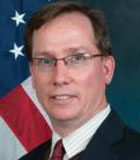 Dr. Timothy Persons is the Chief Scientist of the United States Government Accountability Office (GAO). Dr. Persons is also the Managing Director of GAO’s Science, Technology Assessment, and Analytics team. In this rare dual role, Dr. Persons’ portfolio brings critical foresight to the U.S. Congress on every area of emerging technology, from artificial intelligence to biosafety to nanomanufacturing to synthetic opioids. Dr. Persons leads a large, interdisciplinary team whose work includes:
Dr. Timothy Persons is the Chief Scientist of the United States Government Accountability Office (GAO). Dr. Persons is also the Managing Director of GAO’s Science, Technology Assessment, and Analytics team. In this rare dual role, Dr. Persons’ portfolio brings critical foresight to the U.S. Congress on every area of emerging technology, from artificial intelligence to biosafety to nanomanufacturing to synthetic opioids. Dr. Persons leads a large, interdisciplinary team whose work includes:
- advanced data analytics
- the full spectrum of science, technology and engineering audits
- the establishment of an Innovation Lab
- the authoritative best practices guides for federal agencies acquiring new technology
Prior to joining GAO, Dr. Persons served in key executive roles at the Intelligence Advanced Research Projects Activity (IARPA) and the National Security Agency. Dr. Persons received his B.Sc. (Physics) from JMU, a M.Sc. (Nuclear Physics) from Emory University, and a M.Sc. (Computer Science) and Ph.D. (Biomedical Engineering) degrees from Wake Forest University. He is a senior member of the Institute for Electrical and Electronic Engineers (IEEE), a council member (ex officio) of the National Academy of Sciences, Engineering and Medicine’s (NASEM) Government-University-Industry Research Roundtable (GUIRR), a member (ex officio) of the National Academy of Medicine’s Committee on Emerging Science, Technology, and Innovation, and a member of the Virginia Tech-Wake Forest University Biomedical Engineering and Mechanics (BEAM) Advisory Board.
Panel I: Making Blockchain FISMA-Compliant: Approach and Strategy Being Used by a Multi-Agency Collaborative to Establish a Pilot for Federal Blockchain
Tim Persons, US Government Accountability Office (Moderator)
Michaela Iorga, Co-Chair, NIST Cloud Security Working Group, NIST
Craig Fischer, Program Manager, Office of Financial Innovation and Transformation (FIT), Bureau of Fiscal Service at the Department of Treasury
Yelena Yesha, Distinguished Professor, University of Maryland
Danica Marinac-Dabic, Associate Director of the Office of Clinical Evidence and Analysis, FDA
This panel will discuss key goverment agencies activities, projects, status and what’s next on Blockchain FISMA Compliance.
Tim Person‘s bio appears above.
 Dr. Michaela Iorga serves as senior security technical lead for cloud computing with the National Institute of Standards and Technology (NIST), Computer Security Division. She also chairs the NIST Cloud Computing Public Security Working Group, co-chairs the NIST Cloud Computing Public Forensic Science Working Group and serves as the vice-chair of IEEE NoVA Section. Having previously served in a wide range of consulting positions in both, government and private sector industries, Dr. Iorga has a deep understanding of cybersecurity, risk assessment and information assurance for cloud, fog and IoT systems, identity and credential management, and cyberspace privacy issues. In her role at NIST, Dr. Iorga supports the development and dissemination of cybersecurity standards and guidelines that meet national priorities and promote American innovation and industrial competitiveness. Aligned with NIST’s mission, Dr. Iorga’s work particularly focuses on collaborating with industry, academia, and other government stakeholders on developing a high-level, vendor-neutral cloud, fog, blockchain and IoT security and forensics guidance. Dr. Iorga is also managing several NIST efforts that include the development of the Open Security Controls Assessment Language (OSCAL), the fog computing conceptual model, the cognitive-based IoT devices fingerprinting, and the risk management for cloud-based systems. Dr. Iorga received her Ph.D. from Duke University in North Carolina, USA.
Dr. Michaela Iorga serves as senior security technical lead for cloud computing with the National Institute of Standards and Technology (NIST), Computer Security Division. She also chairs the NIST Cloud Computing Public Security Working Group, co-chairs the NIST Cloud Computing Public Forensic Science Working Group and serves as the vice-chair of IEEE NoVA Section. Having previously served in a wide range of consulting positions in both, government and private sector industries, Dr. Iorga has a deep understanding of cybersecurity, risk assessment and information assurance for cloud, fog and IoT systems, identity and credential management, and cyberspace privacy issues. In her role at NIST, Dr. Iorga supports the development and dissemination of cybersecurity standards and guidelines that meet national priorities and promote American innovation and industrial competitiveness. Aligned with NIST’s mission, Dr. Iorga’s work particularly focuses on collaborating with industry, academia, and other government stakeholders on developing a high-level, vendor-neutral cloud, fog, blockchain and IoT security and forensics guidance. Dr. Iorga is also managing several NIST efforts that include the development of the Open Security Controls Assessment Language (OSCAL), the fog computing conceptual model, the cognitive-based IoT devices fingerprinting, and the risk management for cloud-based systems. Dr. Iorga received her Ph.D. from Duke University in North Carolina, USA.
 Craig Fischer is a Program Manager in the Office of Financial Innovation and Transformation (FIT) within the Bureau of Fiscal Service. Craig leads FIT’s innovation portfolio, where he and his team identify and pursue emerging trends and technologies that may have applicability to the financial management community. Prior to FIT, Craig held positions with a “Big Four” consulting firm, the Chief Financial Officer’s (CFO) Council, House Committee on Oversight and Government Reform and the Government Accountability Office (GAO).
Craig Fischer is a Program Manager in the Office of Financial Innovation and Transformation (FIT) within the Bureau of Fiscal Service. Craig leads FIT’s innovation portfolio, where he and his team identify and pursue emerging trends and technologies that may have applicability to the financial management community. Prior to FIT, Craig held positions with a “Big Four” consulting firm, the Chief Financial Officer’s (CFO) Council, House Committee on Oversight and Government Reform and the Government Accountability Office (GAO).
 Dr. Yelena Yesha is a tenured Distinguished University Professor at the Department of Computer Science and Electrical Engineering at the University of Maryland, Baltimore County. She is also the Director of the National Science Foundation Center for Accelerated Real Time Analytics (CARTA). She received her B.Sc. degrees in Computer Science and in Applied Mathematics from York University, Toronto, Canada, in 1984, and her M.Sc. degree and Ph.D. degree in Computer Science from The Ohio State University in 1986 and 1989, respectively. She has published 14 books as author or editor, and more than 200 papers in prestigious refereed journals and refereed conference proceedings, and has been awarded external funding in a total amount exceeding 40 million dollars. Dr. Yesha is currently working with leading industrial companies and government agencies on new innovative technology in the areas of cybersecurity and big data analytics with applications to electronic commerce, climate change and health. Dr. Yesha is a fellow of the IBM Centre for Advanced Studies.
Dr. Yelena Yesha is a tenured Distinguished University Professor at the Department of Computer Science and Electrical Engineering at the University of Maryland, Baltimore County. She is also the Director of the National Science Foundation Center for Accelerated Real Time Analytics (CARTA). She received her B.Sc. degrees in Computer Science and in Applied Mathematics from York University, Toronto, Canada, in 1984, and her M.Sc. degree and Ph.D. degree in Computer Science from The Ohio State University in 1986 and 1989, respectively. She has published 14 books as author or editor, and more than 200 papers in prestigious refereed journals and refereed conference proceedings, and has been awarded external funding in a total amount exceeding 40 million dollars. Dr. Yesha is currently working with leading industrial companies and government agencies on new innovative technology in the areas of cybersecurity and big data analytics with applications to electronic commerce, climate change and health. Dr. Yesha is a fellow of the IBM Centre for Advanced Studies.
 Danica Marinac-Dabic serves as the Associate Director of the Office of Clinical Evidence and Analysis, at the Food and Drug Administration (FDA), Center for Devices and Radiological Health (CDRH). Prior to this position she was the Director of the CDRH Division of Epidemiology. Dr. Marinac-Dabic has over twenty-five years of experience in obstetrics, gynecology, perinatal epidemiology, and regulatory science and surveillance settings.
Danica Marinac-Dabic serves as the Associate Director of the Office of Clinical Evidence and Analysis, at the Food and Drug Administration (FDA), Center for Devices and Radiological Health (CDRH). Prior to this position she was the Director of the CDRH Division of Epidemiology. Dr. Marinac-Dabic has over twenty-five years of experience in obstetrics, gynecology, perinatal epidemiology, and regulatory science and surveillance settings.
Under Dr. Marinac-Dabic’s leadership, in 2010 FDA/CDRH launched its Medical Device Epidemiology Network (MDEpiNet) Initiative to develop national/international infrastructure and innovative methodological approaches for conducting robust studies and surveillance to improve medical device safety and effectiveness understanding throughout the device life cycle through Public Private Partnership with academia and other stakeholders. Dr. Marinac-Dabic also led the development of the International Consortium of Orthopedic Registries (ICOR) Initiative that was launched in 2011 focusing on development and utilization of distributed model of 30 national and international orthopedic registries; International Consortium of Cardiac Registries (ICCR) launched in 2013 and International Consortium of Vascular Registries (ICVR) launched in 2014, designed to expand collaborative work between international cardiovascular registries and integrate it into medical device regulatory science, active surveillance and comparative effectiveness and safety research. From 2015-2018 Dr. Marinac-Dabic led the Registry Working Group at the International Medical Device Regulators Forum (IMDRF) to develop series of essential principles for international convergence of registry-generated data for regulatory decision making. Since 2017, she leads the PCORTF- funded effort to establish Women’s Health Coordinated Registry Network for addressing
State of the States: A Review of the Current State-Level Blockchain Initiatives
Jason Brett, President & CEO, Value Technology Foundation
John J Piletich, US State Department
As the Founder and Executive Director of the Value Technology Foundation, Jason Brett believes blockchain and digital asset technology can have a profound impact on financial and other sectors of the world economy for the better. Jason is a former federal regulator at the Federal Deposit Insurance Corporation (FDIC) with 18 years of experience in financial services. At the FDIC, Jason conducted quantitative and qualitative analysis during the financial crisis of 2008. Jason evaluated counterparty risk, bond valuations, and credit default swaps for large institutions including Washington Mutual, Wachovia, Lehman Brothers, AIG and Bank of America. His experience as a regulator during a crisis that included the trust of the financial system and the solution offered by blockchain technology drew him to this industry in 2015. He served as the Director of Operations for Policy at the Chamber of Digital Commerce and then as Policy Ambassador for Government and Regulatory Affairs for ConsenSys where he briefed regulators on blockchain technology at the U.S. Treasury, FDIC, Federal Reserve Board, SEC, CFTC, and the Department of Commerce. His latest endeavor is starting the Value Technology Foundation for blockchain and cryptocurrency professionals, a Non-Profit in Washington D.C. focused on education for policymakers and advocacy for research and development efforts in the United States.
 John Piletich is a Foreign Service Officer covering ICT foreign policy in South Central Asia and Eastern Europe and is the lead on distributed ledger technology (DLT) and blockchain in the U.S. Department of State’s Economic Bureau. He combines a multifaceted international experience base with a proven ability to launch new initiatives to promote ICT development and lead the State Department Economic Bureau’s strategic vision on blockchain. In 2018 he successfully managed the U.S. Government campaign to elect Ms. Doreen Bogdan-Martin to a leadership position at the International Telecommunication Union. John previously worked on strategic policy at the United Nations, including in Kosovo, Serbia, North Macedonia, and Montenegro.
John Piletich is a Foreign Service Officer covering ICT foreign policy in South Central Asia and Eastern Europe and is the lead on distributed ledger technology (DLT) and blockchain in the U.S. Department of State’s Economic Bureau. He combines a multifaceted international experience base with a proven ability to launch new initiatives to promote ICT development and lead the State Department Economic Bureau’s strategic vision on blockchain. In 2018 he successfully managed the U.S. Government campaign to elect Ms. Doreen Bogdan-Martin to a leadership position at the International Telecommunication Union. John previously worked on strategic policy at the United Nations, including in Kosovo, Serbia, North Macedonia, and Montenegro.
A Lawyer’s Perspective on Blockchain: Legal Code vs Smart Contract Code
Leonard C. Tillman, Partner, Balch & Bingham LLP
An overview of some of the high level issues associated with incorporating the vagaries of the law into a binary automated system.
Leonard C. Tillman is a partner with Balch & Bingham LLP, an Alabama-based law firm. Leonard has over 32 years of experience and brings a unique perspective to energy blockchain matters having spent the first 17 years of his practice as a member of the firm’s banking section and then transitioning to the firm’s energy section for the most recent 15 years. Leonard is a member of the GridWise Architecture Council (GWAC) which was formed by the U.S. Department of Energy as a team to help shape the architecture of a highly intelligent and interactive electric system. Leonard recently was a panelist and a session co-moderator at the 2019 Institute of Electrical and Electronics Engineers (IEEE)/GWAC-sponsored Transactive Energy Systems Conference in Minnesota. Leonard has been named to the list of the Best Lawyers® in America for his work in Commercial Transactions/UCC Law.
Blockchain: Turning Talk into Tangible Outcomes
Jeff Tennenbaum, Blockchain Solutions Architect, IBM
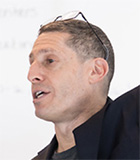 Jeff Tennenbaum is currently a blockchain solutions architect in the Office of the IBM Federal CTO. At IBM, Jeff has served as lead blockchain architect on multiple engagements for U.S. federal agencies. Mr. Tennenbaum has over thirty years of experience at IBM working on transaction processing systems for federal and commercial clients leading both technical support and development teams. Today, Jeff continues to work with federal clients focusing on how the IBM Blockchain Platform and Hyperledger Fabric can drive smarter business processes while providing greater trust in enterprise data.
Jeff Tennenbaum is currently a blockchain solutions architect in the Office of the IBM Federal CTO. At IBM, Jeff has served as lead blockchain architect on multiple engagements for U.S. federal agencies. Mr. Tennenbaum has over thirty years of experience at IBM working on transaction processing systems for federal and commercial clients leading both technical support and development teams. Today, Jeff continues to work with federal clients focusing on how the IBM Blockchain Platform and Hyperledger Fabric can drive smarter business processes while providing greater trust in enterprise data.
Decentralized Trusted Computing Base for Blockchain Infrastructure Security
Thomas Hardjono
There is a growing interest today in blockchain technology as a possible foundation for the future global financial ecosystem. However, in order for this future financial ecosystem to be truly global, with a high degree of interoperability and stability, a number challenges need to be addressed related to infrastructure security. One key aspect concerns the security and robustness of the systems that participate in the blockchain peer-to-peer networks. This presentation discusses the notion of the decentralized trusted computing base as an extension of the TCB concept in trusted computing. We discuss how a decentralized TCB can be useful to (i) harden individual nodes and systems in the blockchain infrastructure, and (ii) be the basis for secure group-oriented computations making within the P2P network of nodes that make-up the blockchain system.
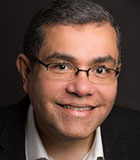 Thomas Hardjono is the CTO of MIT Connection Science and Director of the Trust-Data Consortium at MIT. He leads technical projects and initiatives around identity, security and data privacy, and engages MIT’s industry partners and sponsors on these fronts. Previous to this Thomas was the Director of the MIT Kerberos Consortium, developing the famous MIT Kerberos authentication software currently used by millions of users around the world. He has been active in the areas of security, applied cryptography, trusted computing and identity management for over two decades now, starting from the mid-1990s working in the emerging PKI industry as Principal Scientist at VeriSign, which became the largest PKI provider in the world. His work included devices certificates for DOCSIS cable modems & WiFi devices, and X509 certificates for the Trusted Platform Module (TPM) security hardware. He has chaired a number of key technical groups, including in the IETF, OASIS, Trusted Computing Group, Kantara, Open Music Initiative and other organizations. At MIT Thomas has also been instrumental in leading research and development efforts in the areas of decentralized digital identity, privacy-preserving & trustworthy computation, blockchain interoperability models, AML/KYC in cryptocurrency systems, stable coins, and the use of smart contracts for the open music supply-chain infrastructure.
Thomas Hardjono is the CTO of MIT Connection Science and Director of the Trust-Data Consortium at MIT. He leads technical projects and initiatives around identity, security and data privacy, and engages MIT’s industry partners and sponsors on these fronts. Previous to this Thomas was the Director of the MIT Kerberos Consortium, developing the famous MIT Kerberos authentication software currently used by millions of users around the world. He has been active in the areas of security, applied cryptography, trusted computing and identity management for over two decades now, starting from the mid-1990s working in the emerging PKI industry as Principal Scientist at VeriSign, which became the largest PKI provider in the world. His work included devices certificates for DOCSIS cable modems & WiFi devices, and X509 certificates for the Trusted Platform Module (TPM) security hardware. He has chaired a number of key technical groups, including in the IETF, OASIS, Trusted Computing Group, Kantara, Open Music Initiative and other organizations. At MIT Thomas has also been instrumental in leading research and development efforts in the areas of decentralized digital identity, privacy-preserving & trustworthy computation, blockchain interoperability models, AML/KYC in cryptocurrency systems, stable coins, and the use of smart contracts for the open music supply-chain infrastructure.
Blockchain Data Privacy: Where we are and What’s Next
Theodore Waz, President, The Opinion Blockchain
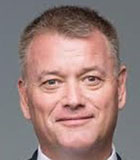 An entrepreneur and investor, Ted Waz is passionate about innovative technologies and relentlessly seeks opportunities that deliver high returns to investors while making a difference is people’s lives. Focus areas include AI/machine learning, blockchain, cryptocurrencies, edge services, cybersecurity, quantum & superchip technologies. Ted spent over 20 years serving and leading Fortune 50 companies such as, UnitedHealth Group, WellPoint, Emdeon, Cleveland Clinic Abu Dhabi, Mubadala Development Corporation and other startups delivering transparency, cross functional collaboration, sustainability, and efficiency. He has an undergraduate degree from Manhattanville College, and attended graduate executive programs at Harvard University (GSE), Harvard Medical School (SQIL), and Oxford University-Said Business School (BSP).
An entrepreneur and investor, Ted Waz is passionate about innovative technologies and relentlessly seeks opportunities that deliver high returns to investors while making a difference is people’s lives. Focus areas include AI/machine learning, blockchain, cryptocurrencies, edge services, cybersecurity, quantum & superchip technologies. Ted spent over 20 years serving and leading Fortune 50 companies such as, UnitedHealth Group, WellPoint, Emdeon, Cleveland Clinic Abu Dhabi, Mubadala Development Corporation and other startups delivering transparency, cross functional collaboration, sustainability, and efficiency. He has an undergraduate degree from Manhattanville College, and attended graduate executive programs at Harvard University (GSE), Harvard Medical School (SQIL), and Oxford University-Said Business School (BSP).
Blockchain Interoperability and Architecture
Claudio Lima, Co-Founder, Blockchain Engineering Council (BEC)
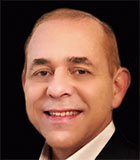 Dr. Claudio Lima is a thought leader in advanced energy (utilities, oil and gas) and telecom/IT, working with emerging technologies and digital transformation. He has a Ph.D. in Electronic Engineering (UKC England, 1995), M.Sc. and B.Sc. in Electrical Engineering. He served as Vice Chair of the IEEE 2030 Smart Grid Standards. He led smart grid and advanced telecom/IT R&D and global initiatives and worked for almost 10 years as Distinguished Member of Technical Staff (DMTS)/ Sr. Research Scientist at Sprint Advanced Technology Labs (Sprint ATL), in Silicon Valley-CA. He also served as co-chair of the Industrial Internet Consortium (IIC)/Energy, Utility and Oil & Gas. Currently, Dr. Lima is co-founder of the Blockchain Engineering Council (BEC), chair of IEEE Blockchain in Energy Standards WG – P2418.5, vice-chair of IEEE Blockchain IoT Standards WG- P2418.1, member of the Blockchain/DLT Cybersecurity Industry Advisory Board (IAB) of PNNL/DOE, co-chair of the IEEE Blockchain in Telecom/Globecom 2019 Blockchain, technical program chair of the 2019 IEEE-NIST Blockchain Global Summit, and former global standards director of EEA Ethereum Enterprise Alliance. He has more than 12+ USPTO patents and +150 conference and peer-review papers publications.
Dr. Claudio Lima is a thought leader in advanced energy (utilities, oil and gas) and telecom/IT, working with emerging technologies and digital transformation. He has a Ph.D. in Electronic Engineering (UKC England, 1995), M.Sc. and B.Sc. in Electrical Engineering. He served as Vice Chair of the IEEE 2030 Smart Grid Standards. He led smart grid and advanced telecom/IT R&D and global initiatives and worked for almost 10 years as Distinguished Member of Technical Staff (DMTS)/ Sr. Research Scientist at Sprint Advanced Technology Labs (Sprint ATL), in Silicon Valley-CA. He also served as co-chair of the Industrial Internet Consortium (IIC)/Energy, Utility and Oil & Gas. Currently, Dr. Lima is co-founder of the Blockchain Engineering Council (BEC), chair of IEEE Blockchain in Energy Standards WG – P2418.5, vice-chair of IEEE Blockchain IoT Standards WG- P2418.1, member of the Blockchain/DLT Cybersecurity Industry Advisory Board (IAB) of PNNL/DOE, co-chair of the IEEE Blockchain in Telecom/Globecom 2019 Blockchain, technical program chair of the 2019 IEEE-NIST Blockchain Global Summit, and former global standards director of EEA Ethereum Enterprise Alliance. He has more than 12+ USPTO patents and +150 conference and peer-review papers publications.
On Avoiding Blockchain Bitrot
Fred Douglis, Chief Research Scientist, Perspecta Labs
While the underpinnings of the blockchain protocol date back to work at Bellcore in the early 1990s, it gained wide visibility with the creation of the Bitcoin protocol in 2009. However, that protocol failed to imagine the implications of the large scale of the Bitcoin ecosystem. The biggest elephant in the room is the wasted energy of all the Bitcoin mining that fails to produce an extension of the blockchain, reported to be comparable to the energy consumption of a small country, but there are other issues of scalability, security, and general fairness. These issues apply not only to Bitcoin but to several other popular blockchain technologies. In this talk I will discuss some of the issues of what are now “legacy blockchain systems” and survey some of the ideas for future-proofing the technology.
 Fred Douglis is a Chief Research Scientist at Perspecta Labs since January 2018, where he works on applied research in the areas of blockchain, network optimization, and security. He was previously with companies including Matsushita, AT&T, IBM, and (Dell) EMC. His research interests included storage, distributed systems, web tools and performance, and mobile computing. He holds a Ph.D. in computer science from U.C. Berkeley.
Fred Douglis is a Chief Research Scientist at Perspecta Labs since January 2018, where he works on applied research in the areas of blockchain, network optimization, and security. He was previously with companies including Matsushita, AT&T, IBM, and (Dell) EMC. His research interests included storage, distributed systems, web tools and performance, and mobile computing. He holds a Ph.D. in computer science from U.C. Berkeley.
Douglis is a member of the IEEE Computer Society Board of Governors and a fellow of the IEEE. He has volunteered with IEEE-CS since 1993 and was named a member of the Golden Core in 2012. He served as EIC of IEEE Internet Computing from 2007-2010 and has been on its editorial board since 1999. He is also on the editorial boards of IEEE Transactions on Computers and IEEE Transactions on Cloud Computing, as well as ACM Transactions on Storage. He formed the IEEE-CS Technical Committee on the Internet, chairing it from 1997-2000, and previously chaired the TC on Operating Systems from 1996-1998.
Fireside Chat: Congressman Bill Foster on Blockchain Government Policies and Regulations
Hosted by Jason Brett, President and CEO, Value Technology Foundation
 Congressman Bill Foster is a scientist and businessman representing the 11th Congressional District of Illinois. He previously served in Congress from March 2008 until January 2011 as the Representative of 14th Congressional District of Illinois. He is the only PhD physicist in Congress.
Congressman Bill Foster is a scientist and businessman representing the 11th Congressional District of Illinois. He previously served in Congress from March 2008 until January 2011 as the Representative of 14th Congressional District of Illinois. He is the only PhD physicist in Congress.
Bill serves on the House Committee on Financial Services, a position he also held in the 110th, 111th, 113th, 114th, and 115th Congresses. As a member of the Financial Services Committee, he advocates for consumer protection and a fair economy for everyone. In response to the Great Recession, he participated in the creation of several important reforms in the financial services and housing sectors, most notably the Dodd-Frank Wall Street Reform and Consumer Protection Act. In addition, Bill serves as chairman of the Financial Services Committee’s Task Force on Artificial Intelligence.
He also serves on the Science, Space, and Technology Committee where he has fought for evidence-based policies and forward-thinking approaches to some of our country’s most pressing issues, including climate change and energy innovation. He also champions sustained federal funding for scientific research.
Bill’s business career began at age 19 when he and his younger brother co-founded Electronic Theatre Controls, Inc., a company that now manufactures over half of the theater lighting equipment in the United States.
Before he became a Member of Congress, Bill worked as a high-energy physicist and particle accelerator designer at Fermi National Accelerator Laboratory (Fermilab). He was a member of the team that discovered the top quark, the heaviest known form of matter. He also led the teams that designed and built several scientific facilities and detectors still in use today, including the Recycler Ring, the latest of Fermilab’s giant particle accelerators.
Government Keynote II: The National Science Foundation (NSF) Blockchain Program for Start-Ups
Anna Brady-Estevez, Director of Blockchain Initiative, National Science Foundation (NSF)
 Anna Brady-Estevez joined the National Science Foundation as SBIR/STTR Program Director in 2016 and started the Distributed Ledger portfolio covering a broad range of technologies (blockchain, DAGs). In this role she brings breadth of background across entrepreneurship and venture capital, innovative research, and direction of corporate strategy and investments. Anna has served as a collaborator with numerous startups having worked as an inventor for an early-stage venture-backed startup, and a Principal Investor for an early-stage venture firm. Anna’s contributions in innovation have been recognized since 2009 when she was selected as one of approximately 30 Kauffman Fellows from around the globe, for leadership in innovation and venture capital. She served as Director of Corporate Strategy for leading multinationals including The AES Corporation and Cummins Inc., and advised numerous clients while serving as a management consultant for The Boston Consulting Group. Anna’s work in these roles resulted in more than $6 billion of infrastructure investments with enhanced returns, identification of billions of dollars in cost reduction opportunities, contributing to a core transformation team of a trillion dollar entity in energy, and the implementation of several new technologies spanning nanotechnology, advanced manufacturing, Big Data and Internet of Things, along with new equipment that enabled transforming energy economics. Anna holds a Ph.D. from Yale University, where she held a National Science Foundation Graduate Research Fellowship; and a B.S. from The Johns Hopkins University.
Anna Brady-Estevez joined the National Science Foundation as SBIR/STTR Program Director in 2016 and started the Distributed Ledger portfolio covering a broad range of technologies (blockchain, DAGs). In this role she brings breadth of background across entrepreneurship and venture capital, innovative research, and direction of corporate strategy and investments. Anna has served as a collaborator with numerous startups having worked as an inventor for an early-stage venture-backed startup, and a Principal Investor for an early-stage venture firm. Anna’s contributions in innovation have been recognized since 2009 when she was selected as one of approximately 30 Kauffman Fellows from around the globe, for leadership in innovation and venture capital. She served as Director of Corporate Strategy for leading multinationals including The AES Corporation and Cummins Inc., and advised numerous clients while serving as a management consultant for The Boston Consulting Group. Anna’s work in these roles resulted in more than $6 billion of infrastructure investments with enhanced returns, identification of billions of dollars in cost reduction opportunities, contributing to a core transformation team of a trillion dollar entity in energy, and the implementation of several new technologies spanning nanotechnology, advanced manufacturing, Big Data and Internet of Things, along with new equipment that enabled transforming energy economics. Anna holds a Ph.D. from Yale University, where she held a National Science Foundation Graduate Research Fellowship; and a B.S. from The Johns Hopkins University.
Blockchain Cybersecurity Trusted Environment (TE)
Mic Bowman, Intel
Dr. Mic Bowman is a senior principal engineer in Intel Labs and leads the distributed ledger research group. Mic has spent over 20 years working on large-scale databases and distributed systems. For the last three years, he has served as a member of the Hyperledger Technical Steering Committee contributing to various aspects of architecture definition and evaluation of technologies for privacy and confidentiality. He is currently working on methods for improving the security, scalability, and privacy of distributed ledgers. He received his PhD in Computer Science from the University of Arizona.
Fireside Chat: Blockchain-Enabled Next-Generation “Circular Economy” Supply Chain Models
Michaela Ulieru, Co-Director, Endor and
Joseph Francis, Principal Director, Accenture
 Dr. Mihaela Ulieru is a scholar of distributed intelligent systems, having pioneered a series of technologies that are bundled under the collective name of “Blockchain”, which consists of over 200 peer reviewed publications, hundreds of invited keynotes and talks, advisor to governments on the adoption of emerging technologies to improve the lives of citizens, as well as mentor to many successful entrepreneurs. In her capacity as Member of the Global Agenda Council on Data Driven Development, Dr. Ulieru advocated to include blockchain among the Top 10 future and emerging technologies at the World Economic Forum in 2016.
Dr. Mihaela Ulieru is a scholar of distributed intelligent systems, having pioneered a series of technologies that are bundled under the collective name of “Blockchain”, which consists of over 200 peer reviewed publications, hundreds of invited keynotes and talks, advisor to governments on the adoption of emerging technologies to improve the lives of citizens, as well as mentor to many successful entrepreneurs. In her capacity as Member of the Global Agenda Council on Data Driven Development, Dr. Ulieru advocated to include blockchain among the Top 10 future and emerging technologies at the World Economic Forum in 2016.
Dr. Ulieru is also President of the IMPACT Institute for the Digital Economy, aiming to capitalize on her achievements as the Canada Research Chair in Adaptive Information Infrastructures for the eSociety which she held for five years since July 2005. In 2007 she was appointed to the Science, Technology and Innovation Council of Canada by the Minister of Industry, to advise the government and provide foresight on innovation issues related to the ICT impact on Canada’s economic development and social well-being against international standards of excellence. In 2006 she was appointed to the Science and Engineering Research Council of Singapore, and in 2010 she was appointed Expert in ICT-Enabled Innovation at the Executive Authority for Scientific Research and Innovation of Romania, and as Adjunct Research Professor at Carleton University, in Ottawa. As a tenured professor at the University of New Brunswick (2005-2012) she founded the Adaptive Risk Management Laboratory with Canada Foundation for Innovation sponsorship. She led several large scale projects funded by NSERC, DRDC, CANARIE and NBIF targeting the management of complex situations through more organic ways of governance.
Industry Keynote: The Trust, Identity, Privacy, Protection, Safety and Security Imperative for IoT: Blockchain and Beyond
Florence D. Hudson, Special Advisor, NSF Cybersecurity Center of Excellence at Indiana University
Our increasingly connected world leveraging the Internet of Things (IoT) creates great value, in connected healthcare, smart cities, and more. The increasing use of IoT also creates great risk. We will discuss the challenges and risks we need to address as technology leaders in IoT and TIPPSS – Trust, Identity, Privacy, Protection, Safety, and Security – for devices, systems and solutions we deliver and use. Blockchain may be part of the solution, if deployed with end to end trust and security in mind, at a system level with TIPPSS. Florence has led IEEE working groups on clinical IoT data validation and interoperability with blockchain, and blockchain for clinical trials. She will share the insights from these initiatives, as well as from her work developing the IoT and smarter planet strategies during her years in IBM, and consulting in industry, research, government and academia.
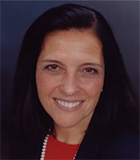 Florence Hudson is Founder & CEO of FDHint, LLC, consulting in advanced technologies, diversity and inclusion. Formerly IBM Vice President and Chief Technology Officer, Internet2 Senior Vice President and Chief Innovation Officer, and an aerospace engineer at Grumman and NASA, she is Special Advisor for TrustedCI – the NSF Cybersecurity Center of Excellence at Indiana University, and Northeast Big Data Innovation Hub at Columbia University. She serves on Boards for Princeton, Cal Poly, and Stony Brook Universities, Blockchain in Healthcare, and the IEEE Engineering in Medicine and Biology Standards Committee (EMB-SC). She is Chair of the IEEE Standards Association working group (P2733) for Clinical Internet of Things (IOT) Data and Device Interoperability with TIPPSS – Trust, Identity, Privacy, Protection, Safety, Security. She authored IEEE articles on “Enabling Trust and Security – TIPPSS for IoT” and “Wearables and Medical Interoperability – the Evolving Frontier”, a chapter on “TIPPSS for Smart Cities” in the 2017 book “Creating, Analysing and Sustaining Smarter Cities: A Systems Perspective” , and is Editor in Chief for the book “Women Securing the Future with TIPPSS for IoT” with 16 women authors from around the globe. She graduated from Princeton University with a BSE in Mechanical and Aerospace Engineering, and attended executive education at Harvard Business School and Columbia University.
Florence Hudson is Founder & CEO of FDHint, LLC, consulting in advanced technologies, diversity and inclusion. Formerly IBM Vice President and Chief Technology Officer, Internet2 Senior Vice President and Chief Innovation Officer, and an aerospace engineer at Grumman and NASA, she is Special Advisor for TrustedCI – the NSF Cybersecurity Center of Excellence at Indiana University, and Northeast Big Data Innovation Hub at Columbia University. She serves on Boards for Princeton, Cal Poly, and Stony Brook Universities, Blockchain in Healthcare, and the IEEE Engineering in Medicine and Biology Standards Committee (EMB-SC). She is Chair of the IEEE Standards Association working group (P2733) for Clinical Internet of Things (IOT) Data and Device Interoperability with TIPPSS – Trust, Identity, Privacy, Protection, Safety, Security. She authored IEEE articles on “Enabling Trust and Security – TIPPSS for IoT” and “Wearables and Medical Interoperability – the Evolving Frontier”, a chapter on “TIPPSS for Smart Cities” in the 2017 book “Creating, Analysing and Sustaining Smarter Cities: A Systems Perspective” , and is Editor in Chief for the book “Women Securing the Future with TIPPSS for IoT” with 16 women authors from around the globe. She graduated from Princeton University with a BSE in Mechanical and Aerospace Engineering, and attended executive education at Harvard Business School and Columbia University.
Panel: Blockchain in Energy
Moderated by Dane Christensen, National Renewable Energy Laboratory (NREL)
Umit Cali, 2nd Vice-Chair, IEEE Energy Blockchain Standards P2418.5
Michael Mylrea, Grid Cybersecurity Research Engineer, Pacific Northwest National Labs (PNNL)/DOE
This panel will discuss blockchain energy applications, platform technology, use cases and applications, cybersecurity of mission critical assets, transactive energy and others. It will also discuss IEEE P2418.5 Blockchain Energy standards development.
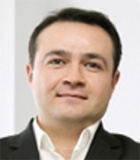 Dr. Umit Cali is a seasoned technology researcher conducting academic-based research activities in energy analytics, blockchain and economics in UNC Charlotte. Dr. Cali has 19 years international experience in the fields of energy systems, data science, blockchain technologies, ICT, energy markets and economics. He has worked for IBM International (Istanbul/Turkey) as a network engineer and project manager, a senior researcher in energy informatics and economics (Fraunhofer Institute – Germany), an Energy Consultant (Lahmeyer International- Germany), a Manager in wind energy project development and energy markets/energy economics (EnBW –Utility in Germany), Chief Technology Officer for an international service provider in energy efficiency (KREEN Renewables GmbH- Germany/Switzerland) and assistant professor in three universities (Gediz University- Turkey, the University of Wisconsin at Platteville and the University of North Carolina at Charlotte).
Dr. Umit Cali is a seasoned technology researcher conducting academic-based research activities in energy analytics, blockchain and economics in UNC Charlotte. Dr. Cali has 19 years international experience in the fields of energy systems, data science, blockchain technologies, ICT, energy markets and economics. He has worked for IBM International (Istanbul/Turkey) as a network engineer and project manager, a senior researcher in energy informatics and economics (Fraunhofer Institute – Germany), an Energy Consultant (Lahmeyer International- Germany), a Manager in wind energy project development and energy markets/energy economics (EnBW –Utility in Germany), Chief Technology Officer for an international service provider in energy efficiency (KREEN Renewables GmbH- Germany/Switzerland) and assistant professor in three universities (Gediz University- Turkey, the University of Wisconsin at Platteville and the University of North Carolina at Charlotte).
Dr. Cali is also co-founder of US (NSF SBIR funded) and Europa based technology startup companies which are active in advanced energy informatics and blockchain. He is serving as active member of IEEE Blockchain in Energy Standards WG (P2418.5).
 Michael Mylrea is Senior Technical Advisor and Blockchain Lead at Pacific Northwest National Laboratory, where he leads various industry and government blockchain R&D projects, including one of the largest federally funded blockchain projects in the U.S. focusing on optimizing and securing critical infrastructure. Michael has 18 years of experience developing solutions for complex cybersecurity and technology challenges for various Fortune 500 companies. He has launched and led a successful cybersecurity consultancy and has held senior technical and leadership positions working with the U.S. Department of Energy and Defense, Cyber Innovation Development (CEO, CISO), Deloitte, US Cyber Consequences Unit, Lakeside Oil, MIT Lincoln Lab, Harvard Berkman Center, and Good Harbor Consulting. He completed his Doctorate at GWU focused on cybersecurity resilience, graduate degrees and coursework at Tufts Fletcher School, Harvard Law School, Western Governors University (MSIA), Tel Aviv University (Fulbright), MIT Sloan; and double majored at University of Wisconsin – Madison.
Michael Mylrea is Senior Technical Advisor and Blockchain Lead at Pacific Northwest National Laboratory, where he leads various industry and government blockchain R&D projects, including one of the largest federally funded blockchain projects in the U.S. focusing on optimizing and securing critical infrastructure. Michael has 18 years of experience developing solutions for complex cybersecurity and technology challenges for various Fortune 500 companies. He has launched and led a successful cybersecurity consultancy and has held senior technical and leadership positions working with the U.S. Department of Energy and Defense, Cyber Innovation Development (CEO, CISO), Deloitte, US Cyber Consequences Unit, Lakeside Oil, MIT Lincoln Lab, Harvard Berkman Center, and Good Harbor Consulting. He completed his Doctorate at GWU focused on cybersecurity resilience, graduate degrees and coursework at Tufts Fletcher School, Harvard Law School, Western Governors University (MSIA), Tel Aviv University (Fulbright), MIT Sloan; and double majored at University of Wisconsin – Madison.
Setting the Standard: Blockchain and the Coming Token-Powered Economy
Ron Resnick, Executive Director, Ethereum Enterprise Alliance (EEA)
Blockchain has the potential to benefit everyone across the globe. However, the task of developing blockchain or tokenization solutions calls for continuous collaboration between creators and the people they will be serving. Learn how individuals, companies, consortiums, think tanks and innovators are working together to harness blockchain and tokenization to make an immediate and concrete difference around the world interoperable through a shared set of industry standards and corresponding certification testing to validate solutions conform to the standard. Blockchain can become the shared infrastructure for global collaboration and exchange. By applying a standards-based approach to blockchain applications, services and tokens, world marketplaces can provide access to essential services and enable more individuals to protect their personal data and assets. Join as we discuss the work that lies ahead, and explore how blockchain standards and standardization of tokens can help make a lasting impact; from buying your next plane ticket to serving the world’s disenfranchised communities. Tokens surround us in everyday life, but we hardly notice them. Blockchain was initially all about the concept of what we now call a token, a crypto currency. Smart Contracts captured the imagination of the enterprise market in 2015 which has perhaps over indexed towards them since. As blockchain technology matures, it’s natural to stop, look back and evaluate how far we have come. In doing so, many have come to the realization that we have neglected the basics of blockchain and its true strength for lack of standards.
 Ron Resnick is a business development professional with over 25 years of experience successfully growing high technology businesses and their ecosystems. Ron is a frequent speaker on blockchain and has spoken at the World Economic Forum’s Davos, Ethereal Summit, SXSW, Consensus, Ethereal Foundation’s DevCon conference, among others. Before his appointment as EEA’s first Executive Director, Ron served as President and Chairman of the Board for AirFuel Alliance, continuing the role he occupied within Power Matters Alliance.
Ron Resnick is a business development professional with over 25 years of experience successfully growing high technology businesses and their ecosystems. Ron is a frequent speaker on blockchain and has spoken at the World Economic Forum’s Davos, Ethereal Summit, SXSW, Consensus, Ethereal Foundation’s DevCon conference, among others. Before his appointment as EEA’s first Executive Director, Ron served as President and Chairman of the Board for AirFuel Alliance, continuing the role he occupied within Power Matters Alliance.
From 2002 – 2012, Ron filled various roles at Intel and as President and Chairman of the Board of the WiMAX Forum, an industry association driving 4G wireless broadband. At Intel, Ron launched and served as General Manager of Intel’s Broadband Wireless business startup delivering one of the first 4G broadband modems. Initial role at Intel included Intel Capital Investment Director and Director of New Business Development at Intel’s Architecture Labs, successfully funding and managing the launch of multiple seed and new business ventures.
Earlier in his career, Ron was Vice President of Marketing at a computer peripherals manufacturer and developed one of the first VOIP instant messaging applications. Prior to his contributions in the corporate world, Ron also served as a pilot in the U.S. Air Force.
Blockchain into State Government: Rhode Island’s Initiative
Elizabeth M. Tanner, Director, Department of Business Regulation, Rhode Island State Goverment
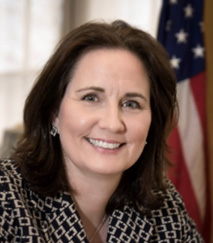 Elizabeth M. Tanner is a graduate of the University of Rhode Island with a B.A. in Political Science and received her Juris Doctor from Western New England University. Her early career focused in the areas of title insurance and real estate law as well as corporate transactional work, focusing on small businesses. While at RI Commerce, Liz oversaw business retention for all in-state businesses and has led an effort to streamline and simplify businesses’ interactions with government. Liz was appointed the Director of Department of Business Regulation in November 2017 where she is continuing her efforts to improve the business climate in Rhode Island.
Elizabeth M. Tanner is a graduate of the University of Rhode Island with a B.A. in Political Science and received her Juris Doctor from Western New England University. Her early career focused in the areas of title insurance and real estate law as well as corporate transactional work, focusing on small businesses. While at RI Commerce, Liz oversaw business retention for all in-state businesses and has led an effort to streamline and simplify businesses’ interactions with government. Liz was appointed the Director of Department of Business Regulation in November 2017 where she is continuing her efforts to improve the business climate in Rhode Island.
A Framework for Blockchain Governance
Thomas B. Cox, VP of Product, StrongBlock
Based in part on the work of the Wharton CryptoGovernance Workshop, this talk provides foundational definitions for blockchain governance concepts and builds from it to establish a comprehensive framework for identifying, analyzing and assessing the governance scheme of a new or existing blockchain system, public or private.
Thomas Cox is Chief Governance Officer at StrongBlock and has spent two years working exclusively on issues of blockchain governance. Mr. Cox was an invitee to the Wharton CryptoGovernance Workshop (July 2019). He worked previously for Block.one, IBM, and Oracle Corp. One of the first certified Oracle DBAs, Mr. Cox is the author of the Low Administration Oracle Specification, the Oracle DBA Checklist, the DBA Maturity Model, and many other white papers and articles, and of the book “Oracle Workgroup Server Handbook.” He ran for Governor of the state of Oregon in 2002. Mr. Cox holds a BA in Behavioral Sciences from the University of Chicago.
Panel: Blockchain in Health Care
Moderated by Heather Flannery, Co-Founder, Blockchain in Health Care Global
Jonathan Holt, Founder, TranSendX
Mitch Parker, Chief Information Security Officer, Indiana University Health
John Callahan, CTO, Veridium
Sean Manion, CEO, Science Distributed
This panel will discuss blockchain health care applications, platform technology, digital asset identity management, data pricavy and cybersecurity. It will also diiscuss IEEE Health Care standards development.
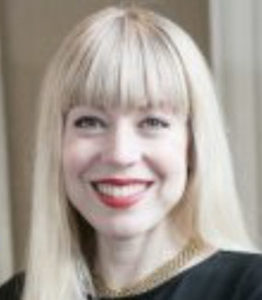 Heather Flannery is the Co-Founder of Blockchain in Healthcare Global, and Co-Chair of Blockchain Task Force, HIMSS. Blockchain in Healthcare Global (BiHG) is a new 501(c)6 membership organization within the IEEE ISTO (ieee-isto.org) working to mitigate the barriers to adoption of blockchain, and converging innovations such as AI and IoMT, in healthcare delivery and the life and social sciences while advancing progress in scientific reproducibility, medical ethics, human rights, and global inclusion. BiHG is developing a trans-jurisdictional policy roadmap and regulatory agenda, seeding industry self-regulation, and driving infrastructure and standards development and adoption in support of the common business interests of its members and for social good.
Heather Flannery is the Co-Founder of Blockchain in Healthcare Global, and Co-Chair of Blockchain Task Force, HIMSS. Blockchain in Healthcare Global (BiHG) is a new 501(c)6 membership organization within the IEEE ISTO (ieee-isto.org) working to mitigate the barriers to adoption of blockchain, and converging innovations such as AI and IoMT, in healthcare delivery and the life and social sciences while advancing progress in scientific reproducibility, medical ethics, human rights, and global inclusion. BiHG is developing a trans-jurisdictional policy roadmap and regulatory agenda, seeding industry self-regulation, and driving infrastructure and standards development and adoption in support of the common business interests of its members and for social good.
Dr. Jonathan Holt brings 20 years of experience with a comprehensive and holistic approach to genetics, clinical medicine and informatics approaches to solving hard problems in healthcare. Previous to starting TranSendX, he was the Executive Vice President, Chief Medical Officer, and Chief Informatics Officer at Seqtech Diagnostics, LLC. In this role, he developed novel bioinformatic algorithms for use in next-generation DNA sequencing to combat food fraud. He continues to serve SeqTech as Secretary on its board of directors. As a contributor to standards development, he has volunteered as a domain expert for the HL7 clinical genomics working group and as an invited expert to the World Wide Web Consortium (W3C). He also provides oversight and guidance to the American Board of Medical Specialties (ABMS) Database and Information Technology Advisory Committee (DITAC) representing the American Board of Genetics and Genomics (ABMGG). Dr. Holt received his medical degree from the University of New England College of Osteopathic Medicine (DO). He began his residency with a traditional osteopathic rotating internship before completing an Internal Medicine Residency at Kaiser Permanente Medical Center in San Francisco, California followed by a residency in Clinical Genetics at the University of California at San Francisco.
Dr. Holt holds a master’s degree in biomedical informatics from the Vanderbilt University Medical Center. He is an elected fellow of the American College of Medical Genetics and Genomics and is triple board-certified in Internal Medicine, Clinical Genetics, and Clinical Informatics (American Board of Preventive Medicine). He is a former faculty member of Stanford University’s department of Medicine and Vanderbilt University Department of Biomedical Informatics and Medicine, Division of Genetic Medicine. Dr. Holt is also a proficient programmer and won the BitFiniti prize at the Distributed-Health Hackathon hosted at the Nashville Entrepreneur Center. He lives in Nashville with his wife and two daughters. He is proud to be an eighth-generation Nashvillian.
 Mitchell Parker, MBA, CISSP, is the Executive Director of Information Security and Compliance at IU Health. Mitch’s focus is on addressing the business needs of Information Security across the organization, contract and vendor management, risk management, and researching and developing security controls for emerging technologies. In addition to his work at IU Health, Mitch speaks at multiple conferences and writes for multiple publications, including CSO, Healthcare IT News, Health Tech Magazine, HealthsystemCIO.com, and SecurityCurrent. Mitch also contributed to Voices of Innovation, recently published by HIMSS, and wrote a textbook chapter on Healthcare Cybersecurity and Regulatory Requirements for a Healthcare Informatics textbook to be published this year.
Mitchell Parker, MBA, CISSP, is the Executive Director of Information Security and Compliance at IU Health. Mitch’s focus is on addressing the business needs of Information Security across the organization, contract and vendor management, risk management, and researching and developing security controls for emerging technologies. In addition to his work at IU Health, Mitch speaks at multiple conferences and writes for multiple publications, including CSO, Healthcare IT News, Health Tech Magazine, HealthsystemCIO.com, and SecurityCurrent. Mitch also contributed to Voices of Innovation, recently published by HIMSS, and wrote a textbook chapter on Healthcare Cybersecurity and Regulatory Requirements for a Healthcare Informatics textbook to be published this year.
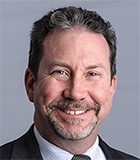 Dr. John Callahan is Chief Technology Officer (CTO) at Veridium, a leading biometric authentication company. Dr. Callahan recently served as the Associate Director for Information Dominance at the US Navy’s Office of Naval Research Global (ONRG) London UK office from 2010-2014 via an Intergovernmental Personnel Act (IPA) assignment from the Johns Hopkins University Applied Physics Laboratory (JHUAPL) in Laurel, Maryland USA. From 2000-2006, Dr. Callahan served as VP of Engineering and CTO of BDMetrics, Inc. and Sphere.com where he managed social networking systems for the world’s largest trade shows such as the Consumer Electronics Show (CES), PackExpo, and National Association of Broadcasters (NAB). Prior to 2001, he was a tenured Associate Professor in the Department of Computer Science and Electrical Engineering at West Virginia University (WVU) in Morgantown, WV USA and research director at the NASA Independent verification and Validation (IV&V) Facility in Fairmont, WV USA. He completed his PhD in Computer Science at the University of Maryland, College Park USA. Dr. Callahan has worked for Xerox Corporation in Palo Alto, CA USA, NASA Goddard Space Flight Center in Greenbelt, MD USA, and IBM Corporation.
Dr. John Callahan is Chief Technology Officer (CTO) at Veridium, a leading biometric authentication company. Dr. Callahan recently served as the Associate Director for Information Dominance at the US Navy’s Office of Naval Research Global (ONRG) London UK office from 2010-2014 via an Intergovernmental Personnel Act (IPA) assignment from the Johns Hopkins University Applied Physics Laboratory (JHUAPL) in Laurel, Maryland USA. From 2000-2006, Dr. Callahan served as VP of Engineering and CTO of BDMetrics, Inc. and Sphere.com where he managed social networking systems for the world’s largest trade shows such as the Consumer Electronics Show (CES), PackExpo, and National Association of Broadcasters (NAB). Prior to 2001, he was a tenured Associate Professor in the Department of Computer Science and Electrical Engineering at West Virginia University (WVU) in Morgantown, WV USA and research director at the NASA Independent verification and Validation (IV&V) Facility in Fairmont, WV USA. He completed his PhD in Computer Science at the University of Maryland, College Park USA. Dr. Callahan has worked for Xerox Corporation in Palo Alto, CA USA, NASA Goddard Space Flight Center in Greenbelt, MD USA, and IBM Corporation.
 Sean Manion is a neuroscientist and former federal research administrator. He is CEO of Science Distributed, dedicated to bringing health researchers together with blockchain as a layer of trust for better science, cheaper research, and faster miracles. He is guest editing a special issue of the peer-reviewed journal Frontiers: “Blockchain for Distributed Research” due out this fall. He is a co-founder of the newly established Blockchain in Healthcare Global, a 501 (c)(6) under the IEEE International Standards & Technology Organization. He is a member of the HIMSS Blockchain Task Force and author of a chapter on research in the HIMSS textbook, “Blockchain in Healthcare: Innovations that Empower Patients, Connect Professionals and Improve Care.” He serves as a the Research sub-group chair for the IEEE Standards Association – Blockchain in Health and Life Sciences working group (2418.6) to develop cross-industry standards.
Sean Manion is a neuroscientist and former federal research administrator. He is CEO of Science Distributed, dedicated to bringing health researchers together with blockchain as a layer of trust for better science, cheaper research, and faster miracles. He is guest editing a special issue of the peer-reviewed journal Frontiers: “Blockchain for Distributed Research” due out this fall. He is a co-founder of the newly established Blockchain in Healthcare Global, a 501 (c)(6) under the IEEE International Standards & Technology Organization. He is a member of the HIMSS Blockchain Task Force and author of a chapter on research in the HIMSS textbook, “Blockchain in Healthcare: Innovations that Empower Patients, Connect Professionals and Improve Care.” He serves as a the Research sub-group chair for the IEEE Standards Association – Blockchain in Health and Life Sciences working group (2418.6) to develop cross-industry standards.
Blockchain Research: What are the Hot topics and What’s Next
Peter Mell, NIST
 Peter Mell is a senior computer scientist in the Computer Security Division at the National Institute of Standards and Technology (NIST). He is an author of the NIST Blockchain Technology Overview publication and has spent the last few years researching managed cryptocurrency systems and blockchain applications for commerce. As a researcher, he is focused on cybersecurity defense and has over 50 research publications. His security research experience includes the areas of network security, intrusion detection, big data, continuous monitoring, cloud computing, security metrics, security automation, and vulnerability databases. He also has started several government initiatives including the National Vulnerability Database, the Federal Risk and Authorization Management Program (FedRAMP), and NIST Security Content Automation Protocol (SCAP) program. He led the technical team in creating version two of the Common Vulnerability Scoring System (CVSS) vulnerability metrics. And he wrote the U.S. government’s definition of cloud computing that was adopted within international standards and that has been cited over 14000 times in scientific publications. Mr. Mell received his undergraduate math and computer science degrees from Vanderbilt University in 1995 and a master’s degree in computer science from the University of California at Davis in 1998.
Peter Mell is a senior computer scientist in the Computer Security Division at the National Institute of Standards and Technology (NIST). He is an author of the NIST Blockchain Technology Overview publication and has spent the last few years researching managed cryptocurrency systems and blockchain applications for commerce. As a researcher, he is focused on cybersecurity defense and has over 50 research publications. His security research experience includes the areas of network security, intrusion detection, big data, continuous monitoring, cloud computing, security metrics, security automation, and vulnerability databases. He also has started several government initiatives including the National Vulnerability Database, the Federal Risk and Authorization Management Program (FedRAMP), and NIST Security Content Automation Protocol (SCAP) program. He led the technical team in creating version two of the Common Vulnerability Scoring System (CVSS) vulnerability metrics. And he wrote the U.S. government’s definition of cloud computing that was adopted within international standards and that has been cited over 14000 times in scientific publications. Mr. Mell received his undergraduate math and computer science degrees from Vanderbilt University in 1995 and a master’s degree in computer science from the University of California at Davis in 1998.
Blockchain and the digital infrastructure for the future
Anant Kadiyala, Director Blockchain & IoT Industry Solutions, Oracle
Technologies like blockchain, IoT, AI/ML, and cloud are compelling and powerful in their own right. However, when used together they slash the ‘transactional costs’ and cause business ecosystems to reconfigure and reorganize. With a focus on blockchain, this session explores the new digital infrastructure underpinnings that are emerging, and unpacks a few new business affordances they enable. Are we ready for the future?!
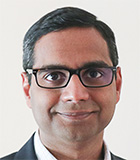 Anant Kadiyala is Senior Director of Transformational Technologies at Oracle, where he leads business innovation initiatives with blockchain, IoT, AI/ML and AR/VR. Anant is a specialist in enterprise digital transformation and applied innovation. He has published numerous articles and keynotes at conferences on applying emerging technologies for business and social good. Earlier, Anant built a consulting practice that specialized in analytics, IoT, PaaS, and middleware solutions for the Fortune 500. His teams won multiple industry awards for building visionary product platforms for customers. Anant is based out of San Francisco Bay Area. His Twitter handle is @akadiyala
Anant Kadiyala is Senior Director of Transformational Technologies at Oracle, where he leads business innovation initiatives with blockchain, IoT, AI/ML and AR/VR. Anant is a specialist in enterprise digital transformation and applied innovation. He has published numerous articles and keynotes at conferences on applying emerging technologies for business and social good. Earlier, Anant built a consulting practice that specialized in analytics, IoT, PaaS, and middleware solutions for the Fortune 500. His teams won multiple industry awards for building visionary product platforms for customers. Anant is based out of San Francisco Bay Area. His Twitter handle is @akadiyala
Multi-Ledger Multi-Cloud: The First Step for Enterprise Blockchain Deployment Automation
Lino Quagliariello
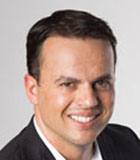 Lino Quagliariello is a successful entrepreneur that, for the last 20 years, has been successfully advising CIOs from midsize and large companies on how to best leverage innovative and legacy technologies for the best business outcomes. Currently, Lino is focused on educating and enabling midsize companies to leverage blockchain as a competitive advantage, by leveraging a real hybrid cloud and on-premises decentralized environment, achieving the best business outcome.
Lino Quagliariello is a successful entrepreneur that, for the last 20 years, has been successfully advising CIOs from midsize and large companies on how to best leverage innovative and legacy technologies for the best business outcomes. Currently, Lino is focused on educating and enabling midsize companies to leverage blockchain as a competitive advantage, by leveraging a real hybrid cloud and on-premises decentralized environment, achieving the best business outcome.
Blockchain in Emerging Economies: Institutional, Technological, Market and Infrastructural Challenges
Nir Kshetri, Bryan School of Business and Economics
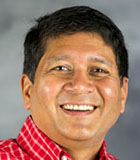 Dr. Nir Kshetri is Professor at University of North Carolina-Greensboro and a research fellow at Kobe University. He holds a Ph D in Business Administration from University of Rhode Island. He has authored eight books. His 2014 book, Global Entrepreneurship: Environment and Strategy (Routledge: New York) has been selected as an Outstanding Academic Title by Choice Magazine. He has published about 120 articles in various journals. Nir worked as a consultant for the Asian Development Bank during 2017-2018. He also participated as lead discussant at the Peer Review meeting of the UN’s Information Economy Report 2013 and 2015. Nir was the winner of 2016 Bryan School Senior Research Excellence Award. He is also a two time winner of the Pacific Telecommunication Council’s Meheroo Jussawalla Research Paper Prize (2010 and 2008). Nir has been quoted/interviewed and/or his work has been featured by hundreds of media outlets worldwide such as Wall Street Journal, Foreign Policy, Scientific American, Bloomberg TV, CBS News, TV Mundo (Peru), ABF TV (Brazil), Fortune, Time, Christian Science Monitor, SF Gate, U.S. News & World Report, New Boston Post, Observer and Salon. In March 2018, he gave a TED Talk about the potential roles of cryptocurrencies in fighting poverty.
Dr. Nir Kshetri is Professor at University of North Carolina-Greensboro and a research fellow at Kobe University. He holds a Ph D in Business Administration from University of Rhode Island. He has authored eight books. His 2014 book, Global Entrepreneurship: Environment and Strategy (Routledge: New York) has been selected as an Outstanding Academic Title by Choice Magazine. He has published about 120 articles in various journals. Nir worked as a consultant for the Asian Development Bank during 2017-2018. He also participated as lead discussant at the Peer Review meeting of the UN’s Information Economy Report 2013 and 2015. Nir was the winner of 2016 Bryan School Senior Research Excellence Award. He is also a two time winner of the Pacific Telecommunication Council’s Meheroo Jussawalla Research Paper Prize (2010 and 2008). Nir has been quoted/interviewed and/or his work has been featured by hundreds of media outlets worldwide such as Wall Street Journal, Foreign Policy, Scientific American, Bloomberg TV, CBS News, TV Mundo (Peru), ABF TV (Brazil), Fortune, Time, Christian Science Monitor, SF Gate, U.S. News & World Report, New Boston Post, Observer and Salon. In March 2018, he gave a TED Talk about the potential roles of cryptocurrencies in fighting poverty.
Panel: Global Patent and IP Landscape in Blockchain
Richard Bemben, Director, Sterne, Kessler, Goldstein & Fox P.L.L.C
Monica Talley, Director, Sterne, Kessler, Goldstein & Fox P.L.L.C
Joseph Mutschelknaus, Director, Sterne, Kessler, Goldstein & Fox P.L.L.C
Ryan Quick, Co-founder, Providentia Worldwide LLC
This panel discussion will provide an overview of patents and other IP in the blockchain and distributed ledger technology industry. It will cover trends in applications and granted patents for blockchain related technologies in the US and internationally, and will also touch on trademark and other brand protection strategies being pursued by leading blockchain companies.
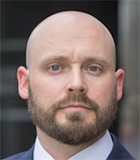 Richard Bemben is a director in Sterne Kessler’s Electronics Practice Group and is a co-leader of the firm’s FinTech and Blockchain technology industry initiative. His practice currently focuses on post-grant matters before the United States Patent and Trademark Office, and Federal Circuit appeals of such matters. He has been counsel of record in dozens of post-grant matters, representing both patent owners and petitioners in diverse technology spaces such as multifunction peripherals, telephony, power management for multicore CPUs, graphics processors, and software for electronic commodities trading. Richard’s practice also includes patent prosecution. He has prosecuted patent applications in a variety of technologies, including: medical devices, large-scale battery energy storage systems, computer security, computer memory, and cable television systems.
Richard Bemben is a director in Sterne Kessler’s Electronics Practice Group and is a co-leader of the firm’s FinTech and Blockchain technology industry initiative. His practice currently focuses on post-grant matters before the United States Patent and Trademark Office, and Federal Circuit appeals of such matters. He has been counsel of record in dozens of post-grant matters, representing both patent owners and petitioners in diverse technology spaces such as multifunction peripherals, telephony, power management for multicore CPUs, graphics processors, and software for electronic commodities trading. Richard’s practice also includes patent prosecution. He has prosecuted patent applications in a variety of technologies, including: medical devices, large-scale battery energy storage systems, computer security, computer memory, and cable television systems.
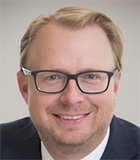 Joseph Mutschelknaus is a director in Sterne Kessler’s Electronics Group where he prosecutes post-issuance proceedings and patent applications before the US Patent and Trademark Office. Mr. Mutschelknaus has extensive experience before the Patent Trial and Appeal Board, challenging and defending already-issued patents. In particular, he handles post-grant review, inter partes review, and covered business method review proceedings under the AIA, representing both petitioners and patent owners. Joe’s areas of technical expertise include object oriented software design, web technologies, data security, graphics, imagery, panoramic photography, geographic information systems, networks, and Internet engineering. Prior to joining Sterne Kessler, he worked in industry, providing software engineering and consulting services.
Joseph Mutschelknaus is a director in Sterne Kessler’s Electronics Group where he prosecutes post-issuance proceedings and patent applications before the US Patent and Trademark Office. Mr. Mutschelknaus has extensive experience before the Patent Trial and Appeal Board, challenging and defending already-issued patents. In particular, he handles post-grant review, inter partes review, and covered business method review proceedings under the AIA, representing both petitioners and patent owners. Joe’s areas of technical expertise include object oriented software design, web technologies, data security, graphics, imagery, panoramic photography, geographic information systems, networks, and Internet engineering. Prior to joining Sterne Kessler, he worked in industry, providing software engineering and consulting services.
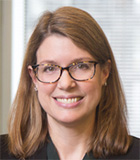 Monica Talley is a director and heads Sterne Kessler’s Trademark & Brand Protection Practice. For more than 20 years she has specialized in strategic trademark counseling and portfolio enhancement, developing anti-counterfeiting solutions and strategies, and resolving trademark disputes. Monica is particularly sought after for her expertise in enforcing brand rights against infringers and counterfeiters seeking to profit from her clients’ well-known brands. Considered one of the leading trademark attorneys in Washington, DC, Monica has been consecutively ranked in the prestigious WTR 1000 since 2012. In addition, Monica has been named an “IP Star” by Managing IP magazine since 2013 and is recognized as one of the magazine’s “Top 250 Women in IP.” Monica is also ranked among the “leading IP practitioners in the world” by the World Intellectual Property Review (WIPR) in their 2017 and 2018 “WIPR Leaders” publication.
Monica Talley is a director and heads Sterne Kessler’s Trademark & Brand Protection Practice. For more than 20 years she has specialized in strategic trademark counseling and portfolio enhancement, developing anti-counterfeiting solutions and strategies, and resolving trademark disputes. Monica is particularly sought after for her expertise in enforcing brand rights against infringers and counterfeiters seeking to profit from her clients’ well-known brands. Considered one of the leading trademark attorneys in Washington, DC, Monica has been consecutively ranked in the prestigious WTR 1000 since 2012. In addition, Monica has been named an “IP Star” by Managing IP magazine since 2013 and is recognized as one of the magazine’s “Top 250 Women in IP.” Monica is also ranked among the “leading IP practitioners in the world” by the World Intellectual Property Review (WIPR) in their 2017 and 2018 “WIPR Leaders” publication.
Ryan Quick has experience in academia, healthcare, retail, manufacturing, and government. Most recently, he headed the PayPal Advanced Technology Group — responsible for PayPal’s high performance computing environments and their specialized computing services and configurations for optimized computational workloads. Ryan is an expert at scale-out systems, UNIX kernel design and profiling, and has been recognized for innovation in hardware and application design, and in messaging ontology and distributed event-driven systems. His current efforts bring machine learning, real-time streaming, set-selection, and digital signal processing technologies to bear on predictive analytics to provide self-healing for command and control systems.
Blockchain in Government: A Playbook for Adoption
Frederic de Vaulx
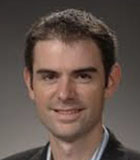 Frederic de Vaulx is Vice President of Prometheus Computing where he helps develop the vision, innovation and strategy of the company. He is also a Senior Software Engineer and Program Manager overseeing the design, architecture and development of custom software applications for Prometheus’ federal and commercial clients. Frederic is a member of the ACT-IAC Emerging Technology Community of Interest and Co-Chair of the Blockchain Working Group that published a blockchain primer in late 2017 and a first version of the blockchain playbook in early 2018.
Frederic de Vaulx is Vice President of Prometheus Computing where he helps develop the vision, innovation and strategy of the company. He is also a Senior Software Engineer and Program Manager overseeing the design, architecture and development of custom software applications for Prometheus’ federal and commercial clients. Frederic is a member of the ACT-IAC Emerging Technology Community of Interest and Co-Chair of the Blockchain Working Group that published a blockchain primer in late 2017 and a first version of the blockchain playbook in early 2018.
Panel: Advanced Blockchain Research
Peter Mell, Sylvere Krima, James Shook and Loic Lesavre, NIST
This panel provide an overview of advanced blockchain research topics led by the US National Institute of Standards and Technology (NIST).
Peter Mell‘s bio appears above.
Dr. Sylvere Krima is a research associate at the National Institute of Standards and Technology (NIST) and a senior consultant at Engisis LLC. He received a Ph.D. in Computer Science from University of Burgundy, France in 2013.He focuses on developing methodologies and tools to implement standard-based interoperability and data traceability through the product lifecycle and supply chain. He currently co-leads a blockchain for Smart Manufacturing project at NIST that focuses on securing the digital thread. Dr. Krima is a co-chair of the Blockchain for Industrial Applications Community Of Interest (COI) and a member of the US TAG for ISO/TC 307 “Blockchain and distributed ledger technologies.
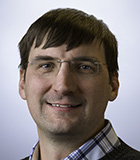 James Shook is a mathematician in the Computer Security Division at the United States National Institute of Standards and Technology (NIST) in Gaithersburg, Maryland. James has a PhD. in Mathematics from the University of Mississippi (2010). His research focuses on consensus algorithms, security protocols, decentralized distributed storage, and other protocols related to blockchains. He also studies graph theory, graph algorithms and their applications to computer security.
James Shook is a mathematician in the Computer Security Division at the United States National Institute of Standards and Technology (NIST) in Gaithersburg, Maryland. James has a PhD. in Mathematics from the University of Mississippi (2010). His research focuses on consensus algorithms, security protocols, decentralized distributed storage, and other protocols related to blockchains. He also studies graph theory, graph algorithms and their applications to computer security.
 Loic Lesavre is a research associate at the National Institute of Standards and Technology (NIST). He received his M.S. in Computer Science and Engineering from Telecom SudParis – IP Paris, France in 2017. His work is focused on blockchain research and development for identity management and cryptocurrency systems. In October 2018, he was awarded a scholarship from ConsenSys to complete the ConsenSys Academy Ethereum Developer Program.
Loic Lesavre is a research associate at the National Institute of Standards and Technology (NIST). He received his M.S. in Computer Science and Engineering from Telecom SudParis – IP Paris, France in 2017. His work is focused on blockchain research and development for identity management and cryptocurrency systems. In October 2018, he was awarded a scholarship from ConsenSys to complete the ConsenSys Academy Ethereum Developer Program.
